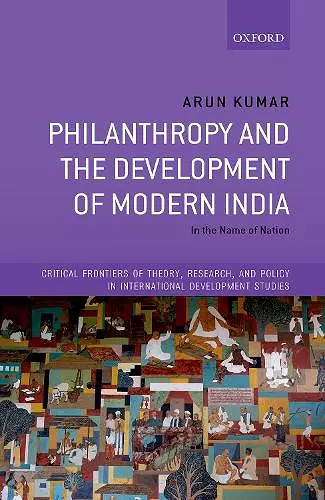Philanthropy and the Development of Modern India
In the Name of Nation
Format:Hardback
Publisher:Oxford University Press
Published:27th Oct '21
Should be back in stock very soon

This insightful work examines how India's economic elites have shaped and been shaped by evolving development concepts, particularly during tumultuous historical periods. Philanthropy and the Development of Modern India provides a nuanced perspective.
In Philanthropy and the Development of Modern India, Arun Kumar explores the evolution of philanthropic efforts among India's economic elites and how their perspectives on development have transformed over time. The author delves into the historical context, illustrating how the notion of development served as a moral foundation for safeguarding commercial interests during a period marked by significant upheaval in Indian society. This examination reveals the complex relationship between economic motives and the broader aspirations of development in the nation’s history.
Kumar goes beyond the conventional critiques of development linked to colonial legacies, instead focusing on the shifts in development paradigms in relation to modernity and the national question. He addresses the intertwined narratives of anti-colonial nationalism and post-colonial nation-building throughout the twentieth century, suggesting that development can be critically analyzed as a form of national-modern. The book identifies four key domains of development: civil society, community, science and technology, and selfhood, outlining how these areas have been influenced by the philanthropic endeavors of the elite.
By juxtaposing socio-economic nationalist reforms from the early twentieth century with post-colonial development initiatives, Philanthropy and the Development of Modern India uncovers the roots of contemporary ideas surrounding self-care, self-reliance, and meritocracy. Kumar posits that these elites, often perceived as obstructive to development, were in fact motivated by a desire to foster progress among various segments of society, using development as a rationale for their commercial pursuits amidst the complexities of the twentieth century.
One of the most important contributions to studies of philanthropy in recent decades, this is an eloquent, ground-breaking study of the relationship between elites and development, raising new insights into the role of philanthropy in nation-building. * Professor Linsey McGoey, University of Essex, UK and author of No Such Thing as a Free Gift *
Arun Kumar has written a fascinating archive-based study of Indian philanthropy over the course of the twentieth century. The book shows in great depth and detail how Indian elite philanthropies - from Bombay Parsis, Marwaris in Calcutta, and Ahmedabad's textile industrialists – forged their ideas of modernity and development within colonial India and after independence. Those elites' caste and religious identities ensured disagreements and debates on the meaning of development and modernity, yet played a profound role in the development of key development concepts such as self-reliance. This comparative approach is one of the most fascinating aspects of this landmark, ground-breaking study. There are few such in depth and detailed original studies of Indian philanthropy – Arun Kumar's book has set a very high bar for future scholars. * Professor Inderjeet Parmar, City University of London, UK and author of Foundations of the American Century *
ISBN: 9780198868637
Dimensions: 241mm x 160mm x 17mm
Weight: 486g
240 pages